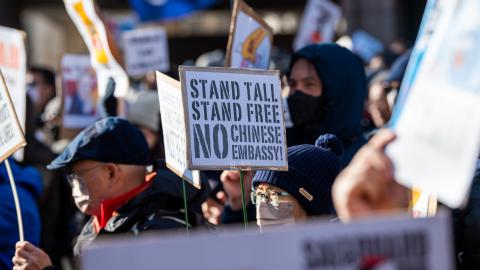A Facebook post or X retweet will get you jail time in the United Kingdom. But accusations of spying for the Chinese Communist Party result in a lighter touch.
Such is the puzzling state of the U.K. today
The decision in mid-September to drop charges against two British citizens accused of spying on parliamentarians and passing information to Chinese intelligence from 2021 to 2023 is roiling London. Prosecutors have said they did “everything possible” to bring a case, but a lack of support from the government sunk the charges.
Due to a recent High Court ruling, bringing the case under the Official Secrets Act of 1911 required prosecutors to show that aid was given to an “enemy.” Shockingly, the government refused to provide evidence to prove this designation for China.
In a highly unusual letter, Director of Public Prosecutions Stephen Parkinson wrote that “efforts to obtain that evidence were made over many months, but notwithstanding the fact that further witness statements were provided, none of these stated that at the time of the [offense] China represented a threat to national security.”
Is that so? If China’s undisguised assistance in support of Russia’s war of aggression against Ukraine or Chinese intellectual property theft were not enough to deem it a threat to national security, consider two other recent striking examples. In March 2024, the U.K. government publicly accused China of hacking its electoral commission in 2021 and 2022. Or consider the consistent targeting of key civilian systems by China. In 2024, ministers in the U.K. were even informed that Chinese hackers likely compromised critical infrastructure in the country.
Is the Chinese Communist Party a threat now? If Keir Starmer’s government will ignore such brazen espionage, one must wonders from what else his government is averting its eyes.
All this is, of course, happening with the backdrop of China’s plans to construct a new embassy complex on the site of the former Royal Mint. Plans submitted contain several blacked-out areas within the complex, raising real concerns among China’s dissident community in the U.K. that these areas may be intended to unlawfully detain individuals.
As concerningly, the former Royal Mint site sits astride a treasure trove of key information infrastructure: fiber optics cables servicing London financial firms and a telephone exchange serving the city.
China’s suspicious embassy plans should give officials pause. Its presence in the heart of London will only act as a facade for a nest of espionage.
It is no wonder, then, that Xi Jinping has waded in personally to push for the embassy’s final approval. The Chinese Communist Party even stands accused of pressuring the U.K. government ahead of the decision by repeatedly cutting off the water supply to the British Embassy in Beijing.
Housing Secretary Steve Reed was set to issue a final ruling on the application on Tuesday, but the date was postponed to Dec. 10. The government’s recent spying fiasco should not inspire optimism in American policymakers.
A Chinese perch at the Royal Mint Court would put American interests at risk. U.S. officials should make clear to their British counterparts that allowing China to construct a new mega-embassy in London is unacceptable.
This all comes on the heels of a Labour parliamentary majority on Monday approving a shockingly self defeating agreement with Mauritius to hand over sovereignty of the Chagos islands while leasing back the base on Diego Garcia for around $135 million a year. This unforced decision undermines American interests in the region and provides a clear opening for Chinese espionage at a critical outpost in the Indian Ocean.
Last October, then-Sen. Marco Rubio (R-Fla.) stated that the handover “would provide an opportunity for communist China to gain valuable intelligence on our naval support facility in Mauritius.” In February, Sen. John Kennedy (R-La.) warned that the U.K. ceding sovereignty of the Chagos islands “is going to really hurt the relationship between the United States of America and the United Kingdom.”
As our closest ally, particularly when it comes to intelligence sharing, the U.K. government’s recent episodes should be deeply troubling to Washington. China’s threat to national security on both sides of the Atlantic is unquestionable, and the British government’s reluctance to confront it undermines Anglo-American interests.
It is time for the Starmer government to stand up to China. The pressure from Beijing is immense, but so too is the risk of failure.
As a famous British author once wrote, “We must all face the choice between what is right and what is easy.”
The U.K. is not alone. Timely words of encouragement and stern warning from the White House might just help the British find their spine.















